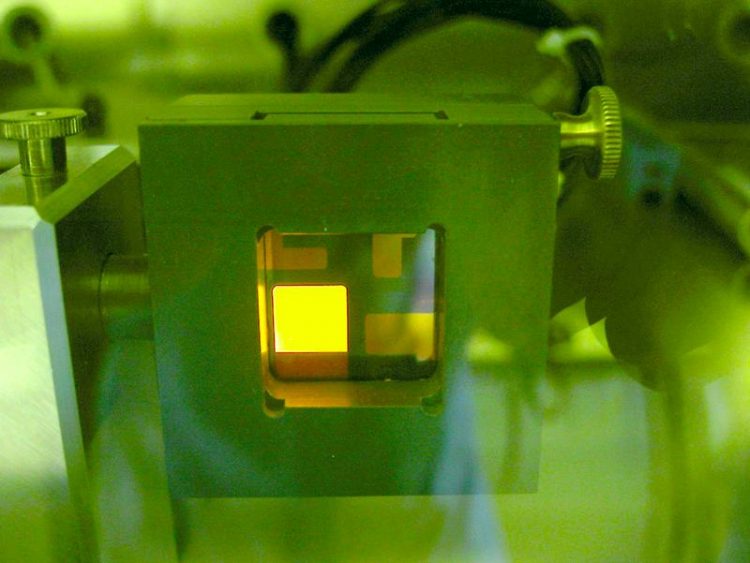Improved stability of plastic light-emitting diodes

Orange-emitting polymer light-emitting diode © MPIP
Monitor screens and smartphones that can be rolled and folded up are applications that could become possible in the future thanks to the development of polymer (plastic) based semiconductors.
Electronics from these conducting plastics pave the way for affordable, flexible and printable electronic components. A major obstacle hindering the market introduction of plastic based light-emitting diodes (PLEDs) is their relatively limited stability.
After a few months of continuous operation their light-output starts to decrease. In spite of many investigations in both industry and academic laboratories the cause of this degradation effect is only poorly understood.
Researchers at the Max Planck Institute for Polymer Research have recently discovered the mechanism causing the PLED degradation.
During degradation defects are formed that strongly reduce the current injected from the positive electrode. Furthermore, these defects lead to unwanted losses in the light generation processes.
The research results are published in the latest edition of the scientific journal Nature Materials.
By using a mixture of two polymers (plastics) the effect of the defects can be strongly suppressed, leasing to improved stability of the PLEDs.
Professor Paul Blom, Director at the Max Planck Institute for Polymer Research and head of its department for Molecular Electronics, and his research team are confident that the improved stability will boost the applicability of plastic light-emitting diodes.
Media Contact
All latest news from the category: Power and Electrical Engineering
This topic covers issues related to energy generation, conversion, transportation and consumption and how the industry is addressing the challenge of energy efficiency in general.
innovations-report provides in-depth and informative reports and articles on subjects ranging from wind energy, fuel cell technology, solar energy, geothermal energy, petroleum, gas, nuclear engineering, alternative energy and energy efficiency to fusion, hydrogen and superconductor technologies.
Newest articles

First-of-its-kind study uses remote sensing to monitor plastic debris in rivers and lakes
Remote sensing creates a cost-effective solution to monitoring plastic pollution. A first-of-its-kind study from researchers at the University of Minnesota Twin Cities shows how remote sensing can help monitor and…

Laser-based artificial neuron mimics nerve cell functions at lightning speed
With a processing speed a billion times faster than nature, chip-based laser neuron could help advance AI tasks such as pattern recognition and sequence prediction. Researchers have developed a laser-based…

Optimising the processing of plastic waste
Just one look in the yellow bin reveals a colourful jumble of different types of plastic. However, the purer and more uniform plastic waste is, the easier it is to…



